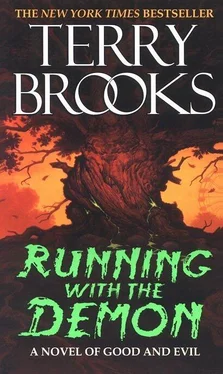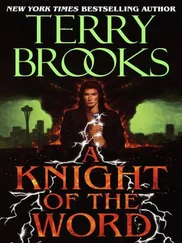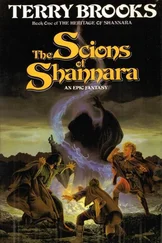The demon watched Howe finish his beer, struggle up in the stale air of the apartment, walk to the kitchen, and fish through the cluttered refrigerator for another. The demon waited patiently. The demon's life was wedded to his cause, and his cause required great patience. He had sacrificed everything to become what he was, but he knew from his transformation at the hands of the Void that sacrifice was required. After he had embraced the Void he had concealed himself until his conscience had rotted and fallen away and left him free. His name had been lost. His history had faded. , His humanity had dissipated and turned to dust. All that he had been had disappeared with the change, so that now he was reborn into his present life and made over into his higher form. It had been hard in the beginning, and once, in a moment of great weakness and despair, he had even thought to reject what he had so readily embraced. But in the end reason had prevailed, and he had forsaken all.
Now it was the cause that drove him, that fed him, that gave him his purpose in life. The cause was everything, and the Void defined the cause as need required. For now, for this brief moment in time, the cause was the destruction of this town and its inhabitants. It was the release of the feeders that lurked in the caves beneath Sinnissippi Park. It was the subversion of Deny Howe. It was the infusion of chaos and madness into the sheltered world of Hopewell.
And it was one thing more, the thing that mattered most.
Deny Howe returned to the sofa and seated himself with a grunt, sipping at his beer. He looked at the demon, seeing him clearly for the first time because the demon was ready now to talk.
"We got to do something, bud," Deny Howe intoned solemnly, nodding to emphasize the importance of his pronouncement. "We got to stop those suckers before they break us."
The demon nodded in response. "If union men cross the picket line and return to work, the strike is finished."
"Can't let them do that." Howe worked his big hands around the beer bottle, twisting slowly. "Damn traitors, anyway! What the hell they think they're doing, selling out the rest of us!"
"What to do?" mused the demon.
"Shoot a few, by God! That'll show them we mean business!"
The demon considered the prospect. "But "that might not stop the others from going back to work. And you would go to jail. You wouldn't be of any use then, would you?"
Deny Howe frowned. He took a long drink out of the bottle. "So what's the answer, bud? We have to do something."
"Think about it like this," suggested the demon, having already done so long ago. "The company plans to reopen the fourteen–inch using company men to fill the skill jobs and scabs to fill the gaps. If they can open one plant and bring back a few of the union men, they can work at opening the others as well. It will snowball on you, if they can just get one mill up and running."
Howe nodded, his face flushed and intense. "Yeah, so?"
The demon smiled, drawing him in. "So, what happens if the company can't open the number–three plant? What happens if they can't get the fourteen–inch up and running?"
Deny Howe stared at him wordlessly, thinking it through.
The demon gave him a hand. "What happens if it becomes clear to everyone that it's dangerous to cross the picket line and work in the mills? What happens, Deny?"
"Yeah, right." A light came on somewhere behind Deny Howe's flat eyes. "No one crosses the line and the strike continues and the company has to give in. Yeah, I get it. But why wouldn't they start up the fourteen–inch? All they need's the workers. Unless …"
The demon spoke the words for him, in his own voice, almost as if in his own mind. "Unless there is an accident."
"An accident," breathed Deny Howe. Excitement lit his rawboned features. "A really bad accident."
"It happens sometimes," said the demon.
"Yeah, it does, doesn't it? An accident. Maybe someone even gets killed. Yeah."
"Think about it," said the demon. "Something will come to you."
Derry Howe was smiling, his mind racing. He drank his beer and mulled over the possibilities the demon's words had suggested to him. It would take little effort from here. A few more nudges. One good push in the right direction. Howe had been a demolitions man in Vietnam. It wouldn't take much for him to figure out how to use that knowledge here. It wouldn't even take courage. It required stupidity and blind conviction, and Derry Howe had plenty of both. That was why the demon had picked him.
The demon leaned back in the rocker and looked away, suddenly bored. What happened with Derry Howe was of such little importance. He was just another match waiting to be struck. Perhaps he would catch fire. You never knew. The demon had learned a long time ago that an explosion resulted most often from an accumulation of sparks. It was a lesson that had served him well. Derry Howe was one of several sparks the demon would strike over the next three days. Some were bound to catch fire; some might even explode. But, in the final analysis, they were all just diversions intended to draw attention away from the demon's real purpose in coming to this tiny, insignificant Midwestern town. If things went the way he intended–and he had every reason to think they would–he would be gone before anyone had any idea at all of his interest in the girl.
And by then, of course, it would be too late to save her.
Nest Freemark went down the back steps two at a time, letting the screen door slam shut behind her. She winced at the sound, belatedly remembering how much it irritated Gran. She always forgot to catch the door. She didn't know why, she just did. She skipped off the gravel walk and onto the lawn, heading across the yard for the park. Mr. Scratch lay stretched out in the shade beneath the closest oak, a white and orange torn, his fluffy sides rising and falling with each labored breath. He was thirteen or fourteen, and he slept most of the time now, dreaming his cat dreams. He didn't even look up at her as she passed, his eyes closed, his ragged ears and scarred face a worn mask of contentment. He had long ago forfeited his mouser duties to the younger and sprier Miss Minx, who, as usual, was nowhere to be seen. Nest smiled at the old cat as she passed. Not for him the trials and tribulations of dealing with the feeders of Sinnissippi Park.
Nest had always known about the feeders. Or at least for as long as she could remember. Even when she hadn't known what they were, she had known they were there. She would catch glimpses of them sometimes, small movements seen out of the corner of one eye, bits and pieces of shadow that didn't quite fit in with their surroundings. She was very small then and not allowed out of the house alone, so she would stand at the windows at twilight, when the feeders were most likely to reveal themselves, and keep watch.
Sometimes her grandmother would take her for walks in the stroller in the cool of the evening, following the dark ribbon of the roadway as it wound through the park, and she would see them then as well. She would point, her eyes shifting to find her grandmother, her child's face solemn and inquisitive, and her grandmother would nod and say, "Yes, I see them. But you don't have to worry, Nest. They won't bother you."
Nor had they, although Nest had never really worried about it much back then. Not knowing what the feeders were, she simply assumed they were like the other creatures that lived in the park–the birds, squirrels, mice, chipmunks, deer, and what have you. Her grandmother never said anything about the feeders, never offered any explanation for them, never even seemed to pay them much attention. When Nest would point, she would always say the same thing and then let the matter drop. Several times Nest mentioned the feeders to her grandfather, but he just stared at her, glanced at her grandmother, and then smiled his most indulgent smile.
Читать дальше











